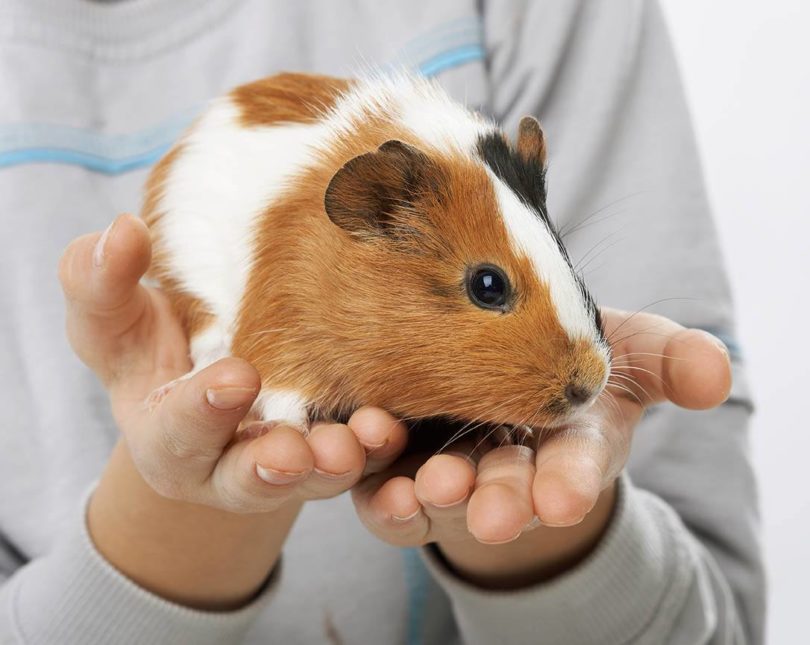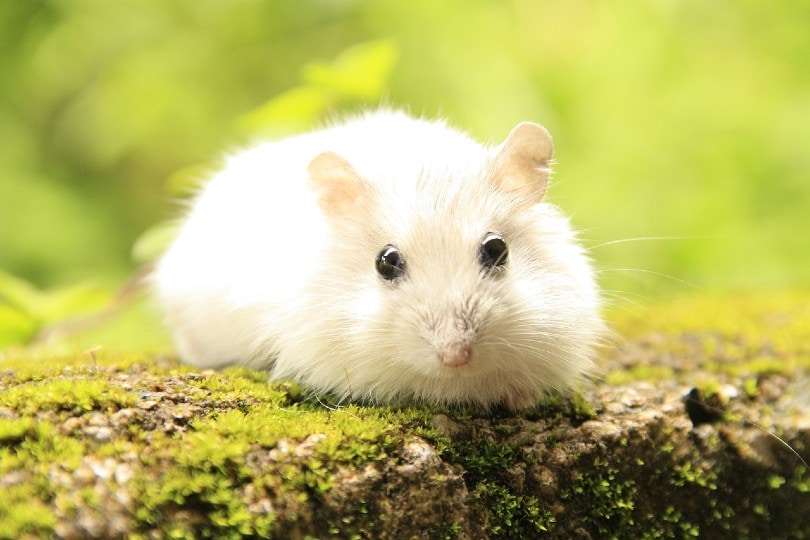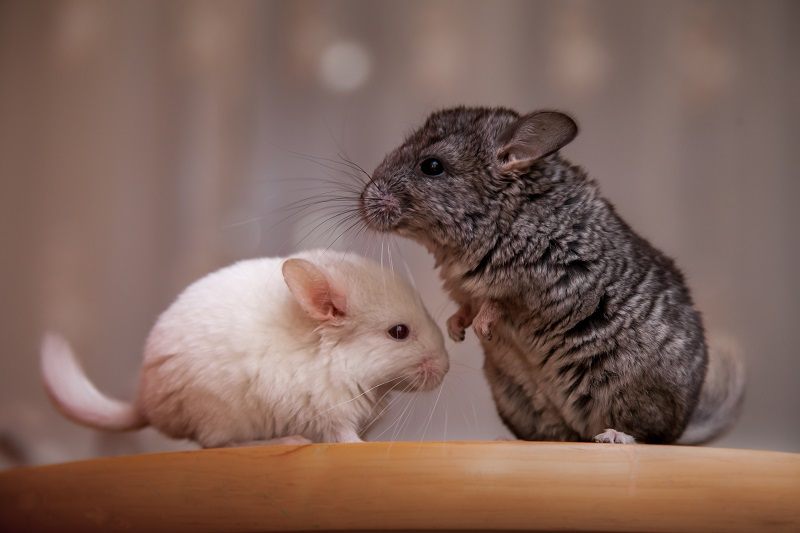VET APPROVED

The information is current and up-to-date in accordance with the latest veterinarian research.
Learn more »Guinea pigs’ nails grow continuously, just like humans. Their toenails file down naturally in the wild, but they don’t often get the same opportunity when kept as pets. For this reason, many guinea pigs require regular nail cutting to save them from the pain and discomfort overgrown and curled nails cause.
But as you know, these pets often get a bit squirmy whenever they have their nails cut, and it would be best to learn how to treat their nails to make the experience as painless and smooth as possible.

Safest & Easiest Ways to Cut Guinea Pig Nails
There are several methods for cutting your piggy’s nails. Here’s one of the ways to do it.
What You’ll Need
- Animal nail clippers
- Styptic powder or cornflour (in case of bleeding when you accidentally cut the quick)
- Hand towel
- Magnifying glasses with LED lights or torch
- Lettuce, grass, or your pet’s favorite food or treats
The 6 Steps to Cut the Nails
1. Wrap Your Guinea Pig in a Hand Towel If Necessary
While many guinea pigs will allow being held and handled for nail clipping, some may need to be wrapped up to avoid wiggling or injuries. Carefully place your piggy on a hand towel and wrap the towel around them. Ensure the towel isn’t too tight to avoid causing them discomfort or stress.
2. Relax Your Pet
Remember, most guinea pigs are the happiest when munching on their favorite food. Therefore, ensure your piggy’s favorite healthy snack is available, as it will help distract your pet while you go on trimming.
3. Position the Pet in Your Lap
The hardest part about nail cutting is getting your guinea pig to hold still. The best way to do it is by sitting on the ground and place the piggy on your lap, facing away from you while the ramp is against your stomach. It’ll help prevent them from backing up.
4. Choose a Leg
Hold your pet upright and choose a leg to trim, and gently hold it out. If the piggy wiggles during this process, release the leg and allow them to calm down before you gently proceed. In most cases, this is easier done with a helper.
5. Secure One of the Nails
Use the hand holding the piggy’s legs to steady the nail between the thumb and the index finger. However, do not squeeze too tight to keep the nail in place, or it may make your pet squirm.
Select the nail starting from one end of the foot as you work your way from the inside to the other end. It’ll help you keep count of the nails you’ve clipped.
Then, pick up the clippers with your other hand and position them in front of the nail you want to trim. Identify the nail’s quick. It’ll be easier to locate on a clear nail than on a black nail. But, a magnifying glass and an LED light can help with that.
6. Trim the Nail
If your guinea pig has see-through nails, you’ll see the quick as the pink part inside the nail. If you can locate the quick, the trick is to cut the extended tip off the nail without getting into the quick. Ensure you are at the right angle; trim the nail below the quick, towards the nail’s end.
Avoid trimming too close to the quick as it’ll be painful for your piggy. Worse still, if you cut the quick, it’s likely to bleed and cause discomfort to your guinea pig.
Proceed with trimming the other nails and give your pet time to relax if they are restless during the session. A treat after each nail clipping can provide positive reinforcement and offer some distraction.

How to Cut Black Guinea Pig Nails
If your piggy’s nails are black, it can be virtually impossible to locate the quick, making it a little disturbing.
Therefore, it would be best to ensure you have extra lighting or additional LED lighting to help. You can also ask someone to help shine the light from beneath the nail for you to see clearly.
Regular cutting sessions can help you guess where it’s safe to clip based on the nail’s shape, although you must be sure and confident. The nail’s tip is usually narrow and appears nearly hollow when you view it from the bottom.
Clip off a very small amount before proceeding and stick closer to the tip of the nail.
Ideally, you can ask a groomer, a vet team member, or an experienced guinea pig parent for help before you attempt it yourself.
How to Cut Curled or Overgrown Nails
As your piggy’s nail continues elongating, the blood supply levels can also follow the nails down. So, if you go ahead and cut the nail to the standard length at once, it may bleed.
It’ll be helpful to seek veterinary assistance, as overgrown nails can be uncomfortable, and clip the nails bit by bit every few days. Clipping a little more often will help you cut to the standard length with the blood vessels shrunk back.
You can now start clipping every 2-4 weeks onwards.
Dealing with Accidents
Even the most careful and experienced guinea pig parents have accidentally cut into the quick and caused it to bleed at one point. If you do, do not panic because, although it may bleed and hurt your pet at that moment, it is not disastrous.
You can stop the bleeding using these techniques:
- Stem the blood using styptic powder. Apply the styptic powder or cornstarch at the bleeding nail tip. These powders may hurt momentarily but are highly effective at stemming the bleeding.
- You can also press the hurting nail into a bar of soap, beeswax, or simply apply pressure to the nail tip if it is minor bleeding.
- All in all, you should ensure the bleeding has stopped before placing your pet back in its enclosure. If it becomes sore and won’t stop bleeding, consult your family vet for alternative advice.


How Often Should You Cut Your Guinea Pig’s Nails?
Most guinea pigs require regular trimming, though the frequency varies among the animals. It would be best to cut the nails once a month or as often as every two weeks. Clipping your piggy’s nails more often will help develop a routine, getting them used to having their nails trimmed and stop the “quick” or blood supply at the nail’s center from growing closer to the tip.
If the tip grows, the nails tend to curl into their footpads, making them extremely challenging. Overgrown and twisted nail tips can cause open wounds on the feet and damage your pet’s skin. The infected footpad can develop pododermatitis (bumblefoot) or inflammation that can in severe cases progress to swelling, tendonitis, or osteomyelitis (conditions with a poor prognosis).
What’s the “Quick” of the Nail in Guinea Pigs?
If you are a piggy parent, you understand how the thought of a “quick” during nail-clipping can make you nervous. The quick is a delicate red blood vessel that runs through the nail and can make your pet uncomfortable and bleed if you accidentally clip it.
You can avoid such accidents by regularly trimming because the more you trim, the faster the “quick” shrinks back, making subsequent cutting sessions easier and less stressful. And if your pig has a black nail, it’d be challenging to locate the “quick” when cutting the nails.
However, if you shine a USB light or a torch through the nail, you may see the blood vessel more clearly. Remember, it would be best only to clip the nail’s tip if you are in doubt, or seek advice from your vet.
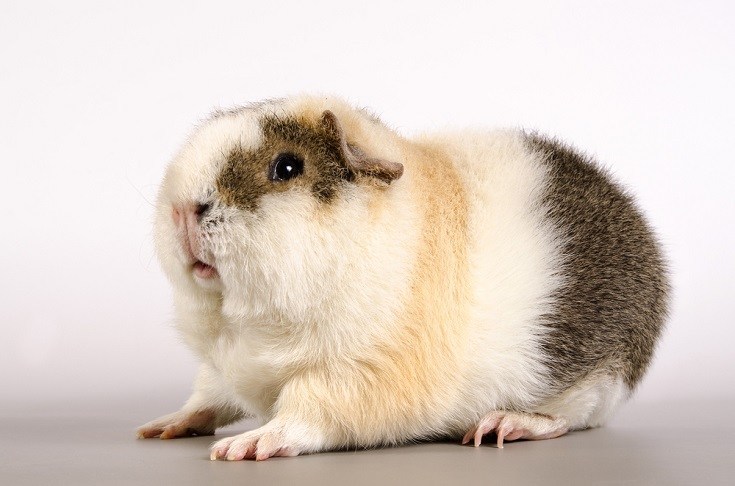

Best Clippers for Cutting Guinea Pig Nails
There are two types of nail clippers you can use:
1. Small Animal Nail Clipper
You can use clippers especially made for clipping your piggy’s nails. These clippers usually have a rounded groove in the blades that can hold the nail and give it a refined, clean finish after cutting.
Examples of small animal nail clippers you can use include Kaytee Small Animal Pro-Nail Trimmer, Babyliss Pro Pet Nail Clipper, and Hertzko Angled Blade.
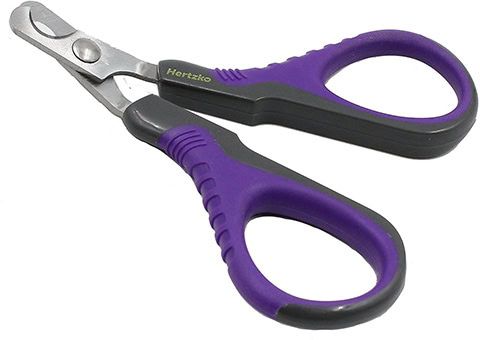
2. Human Nail Clipper
If you don’t yet have pet-designated clippers, you may consider using human clippers. However, be careful as these clippers may flatten or even break the nails, so be sure to trim away the excess nail when using them.
You may find that young piggies have much softer and delicate nails than older guinea pigs because the nails harden and thicken with age. Similarly, nails on the hind limbs tend to be thicker than the front ones. You can try to use human toenail clippers for thicker nails as a short-term solution, but it would be safer and more appropriate to use the dedicated pet clippers.
Examples of human nail clippers you can use include HAWATOUR Nail Clippers and FIXBODY Nail Clippers.

Conclusion
Nail cutting can be a tricky thing even for the most experienced guinea pig owner. However, a little patience and regular trimming will help build confidence and make it easier for you and your pet.
But, do not at any point panic and leave the nail to grow as it’ll make your pet suffer, with the nail getting overgrown, damaging the pad and causing sore feet. So, if you accidentally cut the quick or find the process too concerning, find a professional to help you every month.
Featured Image Credit: Dmytro Vietrov, Shutterstock
Contents
- Safest & Easiest Ways to Cut Guinea Pig Nails
- The 6 Steps to Cut the Nails
- 1. Wrap Your Guinea Pig in a Hand Towel If Necessary
- 2. Relax Your Pet
- 3. Position the Pet in Your Lap
- 4. Choose a Leg
- 5. Secure One of the Nails
- 6. Trim the Nail
- How to Cut Black Guinea Pig Nails
- How to Cut Curled or Overgrown Nails
- Dealing with Accidents
- How Often Should You Cut Your Guinea Pig’s Nails?
- What’s the “Quick” of the Nail in Guinea Pigs?
- Best Clippers for Cutting Guinea Pig Nails
- Conclusion
